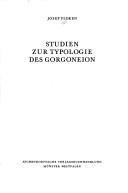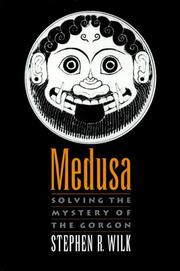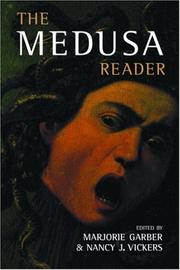| Listing 1 - 8 of 8 |
Sort by
|
Book
Year: 1912 Publisher: Berlin : Borussia,
Abstract | Keywords | Export | Availability | Bookmark
 Loading...
Loading...Choose an application
- Reference Manager
- EndNote
- RefWorks (Direct export to RefWorks)
Book
ISBN: 9781780230955 1780230958 Year: 2013 Publisher: London Reaktion Books
Abstract | Keywords | Export | Availability | Bookmark
 Loading...
Loading...Choose an application
- Reference Manager
- EndNote
- RefWorks (Direct export to RefWorks)
Medusa (Greek mythology) --- Gorgons (Greek mythology) --- Gorgons (Greek mythology). --- Medusa (Greek mythology). --- Rezeption. --- Künste. --- Medusa.

ISBN: 3402057573 Year: 1977 Publisher: Münster Aschendorff
Abstract | Keywords | Export | Availability | Bookmark
 Loading...
Loading...Choose an application
- Reference Manager
- EndNote
- RefWorks (Direct export to RefWorks)
Art, Classical --- Art, Greek --- Gorgons (Greek mythology) in art

ISBN: 0195124316 Year: 2000 Publisher: Oxford Oxford university press
Abstract | Keywords | Export | Availability | Bookmark
 Loading...
Loading...Choose an application
- Reference Manager
- EndNote
- RefWorks (Direct export to RefWorks)
Medusa (Greek mythology). --- Medusa (Greek mythology) --- Gorgons (Greek mythology) --- Mythology, Greek
Book
ISBN: 9789608462625 9608462622 Year: 2010 Publisher: Tripolē : Ekdoseis Phylla,
Abstract | Keywords | Export | Availability | Bookmark
 Loading...
Loading...Choose an application
- Reference Manager
- EndNote
- RefWorks (Direct export to RefWorks)
Vases, Black-figured --- Gorgons (Greek mythology) in art --- Vases à figures noires --- Gorgones (Mythologie grecque) dans l'art --- Héraclès (Mythologie grecque) --- Art --- Heracles --- Art. --- Gorgons (Greek mythology) in art. --- Heracles,
Book
Year: 2015 Publisher: Leiden, The Netherlands : Koninklijke Brill,
Abstract | Keywords | Export | Availability | Bookmark
 Loading...
Loading...Choose an application
- Reference Manager
- EndNote
- RefWorks (Direct export to RefWorks)
Benvenuto Cellini’s Perseus and Medusa , one of Renaissance Italy’s most complex sculptures, is the subject of this study, which proposes that the statue’s androgynous appearance is paradoxical. Symbolizing the male ruler overcoming a female adversary, the Perseus legitimizes patriarchal power; but the physical similarity between Cellini’s characters suggests the hero rose through female agency. Dr. Corretti argues that although not a surrogate for powerful Medici women, Cellini’s Medusa may have reminded viewers that Cosimo I de’ Medici’s power stemmed in part from maternal influence. Drawing upon a vast body of art and literature, Dr. Corretti concludes that Cellini and his contemporaries knew the Gorgon as a version of the Earth Mother, whose image is found in art for Medici women.
Gorgons (Greek mythology) in art. --- Art --- Political aspects --- Cellini, Benvenuto, --- Criticism and interpretation. --- Florence (Italy) --- Politics and government
Book
ISBN: 9789004292192 9789004296787 9004296786 9004292195 Year: 2015 Volume: 4 Publisher: Leiden ; Boston Brill
Abstract | Keywords | Export | Availability | Bookmark
 Loading...
Loading...Choose an application
- Reference Manager
- EndNote
- RefWorks (Direct export to RefWorks)
Benvenuto Cellini’s Perseus and Medusa , one of Renaissance Italy’s most complex sculptures, is the subject of this study, which proposes that the statue’s androgynous appearance is paradoxical. Symbolizing the male ruler overcoming a female adversary, the Perseus legitimizes patriarchal power; but the physical similarity between Cellini’s characters suggests the hero rose through female agency. Dr. Corretti argues that although not a surrogate for powerful Medici women, Cellini’s Medusa may have reminded viewers that Cosimo I de’ Medici’s power stemmed in part from maternal influence. Drawing upon a vast body of art and literature, Dr. Corretti concludes that Cellini and his contemporaries knew the Gorgon as a version of the Earth Mother, whose image is found in art for Medici women.
Gorgons (Greek mythology) in art. --- Art --- Gorgons in art --- Art, Occidental --- Art, Visual --- Art, Western (Western countries) --- Arts, Fine --- Arts, Visual --- Fine arts --- Iconography --- Occidental art --- Visual arts --- Western art (Western countries) --- Arts --- Aesthetics --- Political aspects --- Cellini, Benvenuto, --- Criticism and interpretation. --- Florence (Italy) --- Politics and government --- Cellini, Benvenuto

ISBN: 0415900999 0415900980 Year: 2003 Publisher: London : Routledge,
Abstract | Keywords | Export | Availability | Bookmark
 Loading...
Loading...Choose an application
- Reference Manager
- EndNote
- RefWorks (Direct export to RefWorks)
Fascinating and terrifying, the Medusa story has long been a powerful signifier in culture with poets, feminists, anthropologists, psychoanalysts, political theorists, artists, writers, and others. Bringing together the essential passages and commentary about Medusa, The Medusa Reader traces her through the ages, from classical times through the Renaissance to the pop culture, art, and fashion of today. This collection, with a critical introduction and striking illustrations, is the first major anthology of primary material and critical commentary on this most provocative and enigmatic of figures.
Comparative literature --- Thematology --- Medusa --- iconografie --- mythologische figuren --- literatuur --- Homerus --- Euripides --- Ovidius --- 82:3 --- 82.091 --- Literatuur en maatschappijwetenschappen --- Vergelijkende literatuurstudie --- Medusa (Greek mythology) --- 82.091 Vergelijkende literatuurstudie --- 82:3 Literatuur en maatschappijwetenschappen --- Medusa (Greek mythology). --- Gorgons (Greek mythology) --- Mythology, Greek --- Medusa [Mythological character] --- Medusa. --- Homerus. --- Euripides. --- Ovidius.
| Listing 1 - 8 of 8 |
Sort by
|

 Search
Search Feedback
Feedback About UniCat
About UniCat  Help
Help News
News